AUTHORS OF THE IMPOSSIBLE
The Paranormal and the Sacred
JEFFREY J. KRIPAL
THE UNIVERSITY OF CHICAGO PRESS
CHICAGO AND LONDON
The University of Chicago Press, Chicago 60637
The University of Chicago Press, Ltd., London
2010 by The University of Chicago
All rights reserved. Published 2010.
Paperback edition 2011
Printed in the United States of America
20 19 18 17 16 15 14 13 12 11 2 3 4 5 6
ISBN-13: 978-0-226-45386-6 (cloth)
ISBN-10: 0-226-45386-3 (cloth)
ISBN-13: 978-0-226-45387-3 (paper)
ISBN-10: 0-226-45387-1 (paper)
ISBN-13: 978-0-226-45389-7 (e-book)
Frontispiece: Ailleurs (circa 1960) by Arthur-Maria Rener (191291). Vallee private collection, hanging over the Vallee-Hynek parapsychological library. Used with permission.
Library of Congress Cataloging-in-Publication Data:
Kripal, Jeffrey John, 1962
Authors of the impossible : the paranormal and the sacred / Jeffrey J. Kripal.
p. cm.
Includes bibliographical references and index.
ISBN-13: 978-0-226-45386-6 (cloth: alk. paper)
ISBN-10: 0-226-45386-3 (cloth : alk. paper) 1. ParapsychologyHistory. 2. ReligionPsychic aspects. 3. Myers, Frederic William Henry, 18431901. 4. Society for Psychical Research (Great Britain) 5. Fort, Charles, 18741932. I. Title.
BF1028.K75 2010
130dc22
2009029969
 This paper meets the requirements of ANSI/NISO Z39.48-1992 (Permanence of Paper).
This paper meets the requirements of ANSI/NISO Z39.48-1992 (Permanence of Paper).
for David
for taking many chances on an aspiring author of the impossible who has tried his best not to become an impossible author
Read a book, or look at a picture. The composer has taken a wild talent that nobody else in the world believed in; a thing that came and went and flouted and deceived him; maybe starved him; almost ruined himand has put that damn thing to work.
CHARLES FORT, Wild Talents
DIMENSIONS
.
ACKNOWLEDGMENTS
All things cut an umbilical cord only to clutch a breast.
CHARLES FORT, The Book of the Damned
Professionally speaking, ones intellectual and personal debts are inscribed in ones footnotes, but such secreted allusions seldom carry the full force of all those connections of person, place, and project that make a work of scholarship finally pop into view. Nor, alas, do long lists of names on an acknowledgments page. So I will try to write sentences here, and keep things short and to the point, which is to say, to the person.
The book is dedicated to T. David Brent, the editor of all six of my Chicago monographs (the sixth still coming to be). I do not underestimate, and I cannot overestimate, what David and the presss support have meant to me over the years, both those of the past and those spread out into the future (for publishing books is very much about the future). I mean every word of the dedication, and then some.
Michael Murphy and the Esalen Institutes Center for Theory and Research have generously supported an annual symposia series that I conceived and subsequently direct on the paranormal and popular culture in Big Sur each May. The latter is part of Esalens Sursem research group on postmortem survival, of which I am deeply honored to be a part. Much of the talent of these two symposia series, and particularly Sursem, is represented in the pages that follow. Of special note are Stephen Braude, Adam Crabtree, Edward Kelly, Emily Williams Kelly, Dean Radin, Russell Targ, and Charles Tart.
Two of my four authors of the impossible, Jacques Vallee and Bertrand Mheust, also deserve special mention. Jacques went out of his way to welcome me into the inner sanctum of his home and library, shared with me many unpublished materials and secret stories, and responded to my thoughts about his work with helpful criticism and further insight. Bertrand was gracious and patient with an American English speaker struggling through thousands of pages of his erudite French. He even went so far as to declare what were clear translation errors on my part philosophical insights. This was very flattering. And very funny. Ive fixed those errors. The reader can draw his or her own conclusion about what that means. I have also laughed a great deal with Bertrand, mostly in Big Sur, where he was once attacked by the dreaded black Spider-Man. That was very funny too. I deny everything.
I must also mention Victoria Nelson, whose work in The Secret Life of Puppets (Harvard, 2001) played a special role in the inspirationit is really more of an uncanny hauntingfor this book. Vicki has been a constant source of support, advice, and mind-bogglingly detailed editorial help. She also helped introduce me to other academics and professional writers more or less secretly working on such matters. One of the main goals of the present work is to help create a safe, or at least a safer, intellectual space within the humanities and the arts so that such writers working off the page can come back on the page and enlighten us about the deeper dialectics of consciousness and culture.
In terms of the Fort materials, I must thank Jim Steinmeyer, Forts recent talented biographer. Fort is a veritable ocean in which one can easily get lost and drown. Jims biography came at a crucial time for me and showed me my own way through the waves and fishes. The following individuals have also played key roles in one way or another: Kelly Bulkeley, who generously described (or compassionately lied about) my treatment of the neuroscientific materials as just right; Brenda Denzler, who taught me about the history of ufology and the professional costs involved in such anomalous interests; David Hufford, who taught me that materialism and rationalism are not the same thing, at all; Chad Pevateaux, my graduate student who has accomplished innumerable source-checking, editing, and indexing tasks for me with his usual Derridean verve and Blakean grace; and Jody Radzik, whose nondual experiences have long functioned for me as a kind of living mirror in which I can catch a fleeting glimpse of my own X. Thank you all.
Finally, I must thank Scott Jones of XL Films. XL Films has optioned this book for a feature documentary now in process. Scott showed great enthusiasm for the cinematic potentials of my thought and is presently teaching me that the paranormal mysteries of reading and writing extend into the acts of viewing and seeing as well. We are back to Platos Cave and those shadows of social, historical, and religious truth projected on the cave wall now called a theater screen. Happily, there is also a way out of the cavelike theatre, always, of course, through that back door and sticky floor behind the projector.
Only spilled soda pop and bad carpet block our way out now...
An Impossible Opening
THE MAGICAL POLITICS OF BOBBY KENNEDY
A dear friend, a great scientist, now dead, used to tease me by saying that because politics is the art of the possible, it appeals only to second-rate minds. The first-raters, he claimed, were only interested in the impossible.
ARTHUR C. CLARKE, The Fountain of Paradise
An opening is a beginning, but it is also a hole.
I want to open with a story that could not have possibly happened, which happened. I have chosen this story carefully. It is neither abstract nor distant to me. I know the central visionary well and can vouch for his complete integrity and honesty. I have absolutely no doubt that this event happened to this individual as described below. What it, and countless other stories like it, mean is quite another matter. Which is why I wrote this book.
I will suggest no adequate explanation for this impossible possibility. The simple truth is that I do not have one. Nor, I suspect, do you, or anyone else for that matter, other than, of course, the professional debunker, whose ideological denials boil down to the claim that such things never happened or, if they did, that they are just anecdotes unworthy of our serious attention and careful thought. Such mock rationalisms, such defense mechanisms, such cowardly refusals to think before the abyss will win nothing here but my own mocking laughter. Each of us, after all, is just such an irreducible, unrepeatable, unquantifiable Anecdote.
Next page
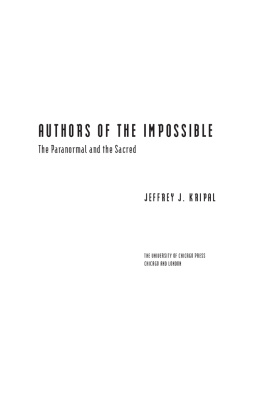
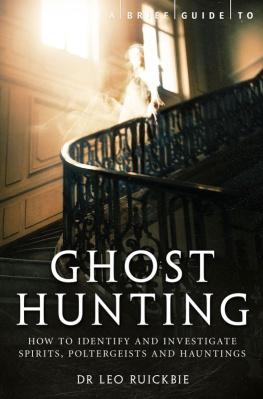
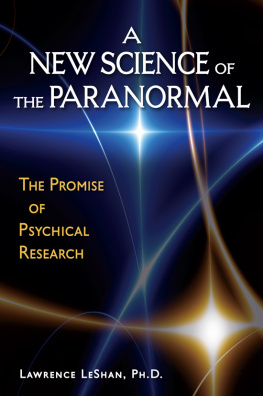

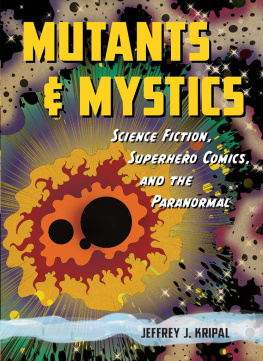
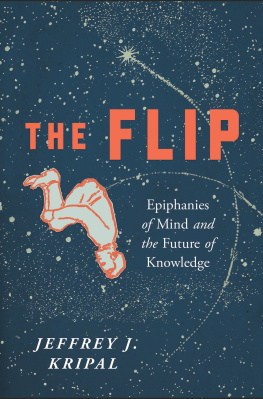
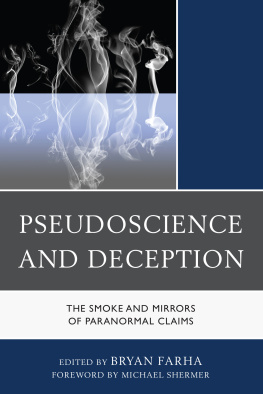
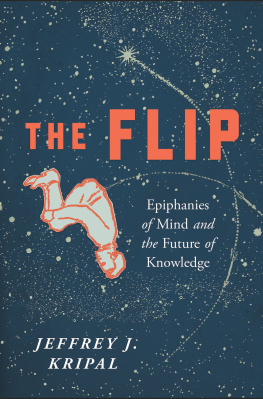
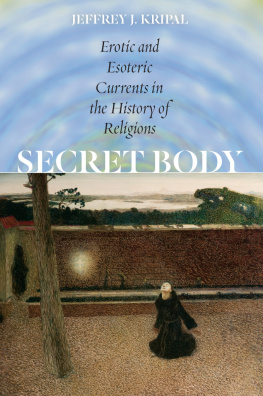
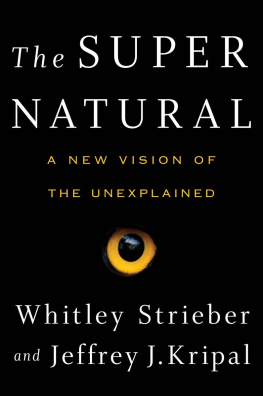
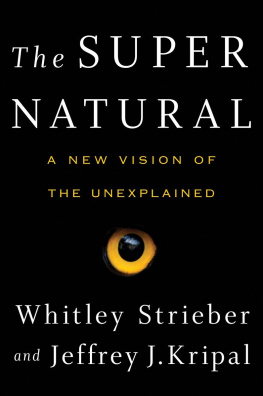
 This paper meets the requirements of ANSI/NISO Z39.48-1992 (Permanence of Paper).
This paper meets the requirements of ANSI/NISO Z39.48-1992 (Permanence of Paper).